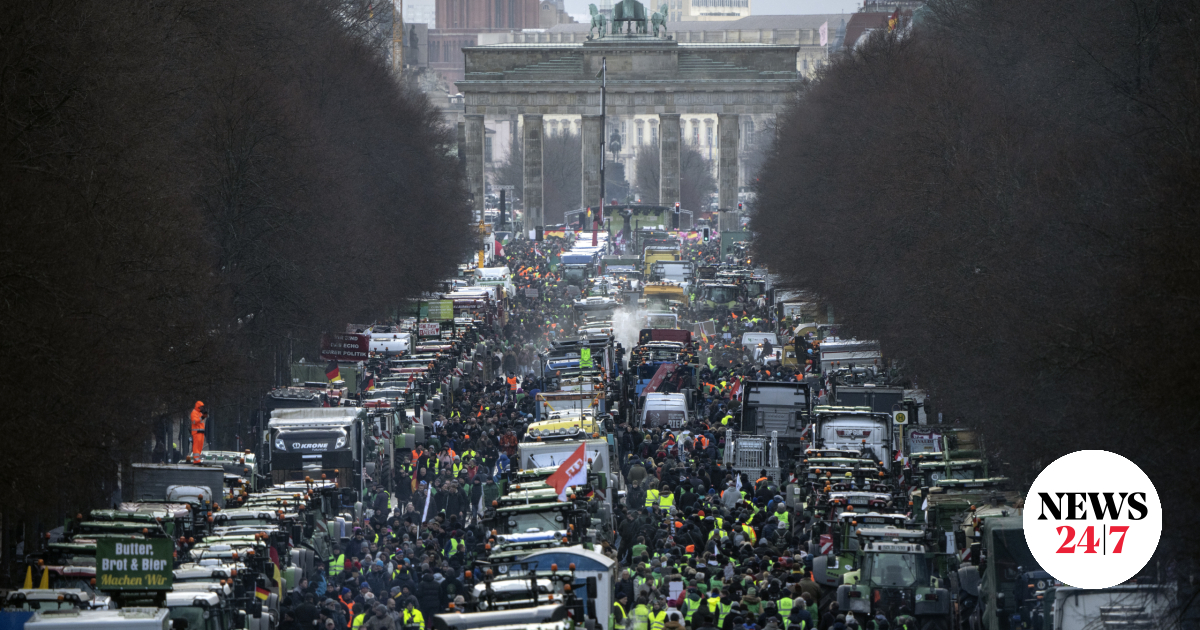
“Order prevails in Berlin!” Thus the revolutionary Rosa Luxemburg bitterly mocked the government, at the conclusion of her last text, a few hours before her assassination in 1919. One hundred and five years later, the system is again being disrupted in Berlin and throughout Germany by mobilization. which has Economic and political background. But is the unrest we are seeing in the European Union's most populous country really that great? Where could they end up?
Rural mobilization: as in Greece
The agricultural sector in Germany is one of the four largest sectors in the European Union, with no less than 550,000 employees and a net income of 43.7 billion euros. Farmers in 256,000 agricultural production enterprises have been “warming up their tractors” since December, while Greek channels have been regularly reporting on similar moves, and they have done so astonishingly. At the dawn of the new year, on January 4th, farmers from the state of Schleswig-Holstein prevented Vice-Chancellor and Minister of Economy Robert Hambeck from boarding the ferry as he returned from his vacation. Since January 8, they have blocked regional and national roads, and demonstrated with their tractors in Hamburg, Berlin and elsewhere.
Tractors block the road in Germany.
SOC
Are they hindering the country's economy? But this does not prevent German society from strongly supporting them, the majority. More than 68% of citizens support the movement. The government said the reduction in vehicle tax for farmers would remain in place, while diesel subsidies would be phased out over several years rather than immediately, but this did not satisfy the protesters. Thus, the chairs of the three parliamentary groups, Rolf Mutzenich (SPD), Britta Hasselmann (Greens) and Christian Dürr (FDP), invited the representatives to the meeting via letter. Farmers on MondayPeak mobilization day with a large demonstration in the capital, Berlin. Their demand is not to reduce support, which amounts to about 900 million euros, and they are supported by the conservatives, who are part of the Social Democratic Party and the far right. Small and medium-sized enterprises, artisans and ordinary workers in industry are demonstrating with them.
Railway strike and a new round of strike clashes
State-owned Deutsche Bahn is the world's railway giant: with 325,000 employees and revenues of $56.3 billion, it serves about 132 million long-distance and 1.6 billion domestic route passengers, and carries about 222 million tons of freight in 2022. From Wednesday through Friday, thousands of services were canceled (about 80%) and millions of people missed trains due to a three-day strike by the conductors' union.
The strike, which also includes freight train drivers, has been called by the GDL union, which is demanding at least a wage increase 555 euros per monthReducing the weekly working time from 38 to 35 hours and an inflation bonus of 3,000 euros. Train drivers stressed in their advertisements that they would continue their mobilization if their demands were not met.
Rounds of collective bargaining are scheduled to take place during 2024 in the retail, construction, aviation, chemicals, metals and electrical industries, which appear to have a strong chance of strikes in these industries. Meanwhile, bus drivers are on the fence about tolls, and doctors are likely to decide to close surgeries to support their demand for more government support in the overburdened health system.
What happens; Failures (!) of Germany
Frankfurt, the financial center of Germany.
The International Monetary Fund expects Germany to be the only major global economy to contract this year, according to its latest report. The OECD, for its part, expects Germany to be hit hard by the global economic slowdown, due to weak trade and high interest rates around the world. since Inflation continues At high levels, with stagnant demand and high unemployment (about 2.6 million people remain unemployed in 2023, about 200,000 more than in 2022), most economic reports expect the economy to contract by 0.6% in 2024.
There appear to be structural macroeconomic problems. For example, when it comes to technological competition with China in the automobile sector, Germany's leading industrial company, things are not going well. Especially in the field of electricity, where Chinese automakers account for 40% of the market share. In this sense investments Decrease. At the same time, again with regard to China, the decline in the purchasing power of consumers in the large Asian country after the Covid-19 crisis reduces Germany's exports to it, its fourth most important trading partner, affecting the largest economy in Europe.
But the problem is not only there. By the way, and to Housing construction sectorLast October, 22.2% of companies canceled their projects, according to data from the economic institute Ifo, which has been happening since 1991. Meanwhile, no new railway project has received the green light in 2023, with German Railways showing losses of 30 billion. dollars due to chronic divestment.
Unusual disasters also occur, such as crop floods due to the effects of the El Niño phenomenon. At the same time, energy problems have become urgent due to climate change and the war in Ukraine. In this way the energy-intensive German industry actually registered Reduction in productionThey are 17% lower than they were at the beginning of 2022, and further rises in energy prices could exacerbate the situation. It is worth noting that Germany closed its nuclear plants, and therefore no longer has alternatives for energy. Add to that the country's massive and persistent demographic problem, and you get the full picture. Consider the statement issued by the head of Germany's digital industries association, Bitkom, who described the country as a “failed state” when it comes to digital government services.
Government responses, the rise of the far right and austerity in the background
The three-party government expected the train to arrive, but its economic trick did not work. In mid-November, the German Constitutional Court canceled the expected redistribution of economic restructuring loans (originally intended to deal with the coronavirus) amounting to 59.15 billion euros. Then, said the head of global macroeconomic research at ING CNNCarsten Brzeski is grim. “German industrial order books have been empty over the past 12 months,” he said. For his part, Thomas Obst, chief economist at the Cologne Institute for Economic Research, stressed that persistent inflation is eroding the purchasing power of Germans, fueling “pessimism among households.”
The German government is under intense pressure over cuts in several key sectors in 2024. According to a new Bild newspaper poll, two out of three Germans want a change in the chancellorship, considering Social Democrat Olaf Scholz unsuitable.
Against this background, halfway through Olaf Scholz's embattled and divided coalition's four-year term, 82% of German voters are less or not at all happy with his performance. The German government is under intense pressure over cuts in several key sectors in 2024. According to a new Bild newspaper poll, two out of three Germans want a change in the chancellorship, considering Social Democrat Olaf Scholz unsuitable.
Giorgos Bassas moved to dw An excerpt from an article in the economic magazine Handelsblatt that should shake us. So, he wrote, “2024 could be the year in which the resilience of federal democracy will be tested more than ever in its 75-year history. In the fall, elections will be held in three eastern states – and in all of them the AfD is leading.” Germany, while it is possible that the party will take control of the east already early, in municipal elections for municipal councils and regional administrations.German Food and Agriculture Minister Cem Isdemir, in an interview, warned of the possibility of a deep split in the party. German societyBut he stressed that the country “should not cross the threshold that the United States crossed with Donald Trump. Our goal should be to keep the country united at the center.” Against this bleak backdrop, talk of banning the AfD appears to be rising in the circles of Germany's mainstream political class following revelations that its members participated in a secret meeting of right-wing extremists where a “master plan” to deport millions of people was drawn up. Discussed, including immigrants and “non-assimilated citizens,” she says Politician. And Zara Wagenknecht is somewhere in there with her new party promoting anti-immigration policies.
Where does all of the above lead? Is Germany the elephant in the room that everyone has now seen? not exactly. The German economy is still huge and it seems impossible to venture too big. Holger Schmieding, the economist who first described Germany as the “sick man of Europe” in 1998, Believes that “The current wave of pessimism” about the German economy too much». However, we know that the economic crisis in Germany at the end of the twentiethSh The 20th century was solved by the neoliberal “Agenda 2010” put forward by the Social Democrat Gerhard Schröder. This was her internal, veiled memo before the global crisis in 2009.
The Guardian in its editorial titled “This is not the time for austerity”He is clear that this should not happen again, and underscores the concern we should all feel. It states: “In challenging new times, fiscal rules may need to be revised in order to continue to thrive in valuable consociational traditions. Amid recession and renewed austerity, this week’s highly unusual wave of strikes and protests shows that the country is dramatically polarised.” To worry.

“Hipster-friendly coffee fanatic. Subtly charming bacon advocate. Friend of animals everywhere.”




More Stories
Israel rejects Hamas’s truce proposal and goes ahead with the operation in Rafah
Saudi Arabia is pushing for a “Plan B” that excludes Israel from the main US deal
Erdogan transforms the historic Byzantine monastery of Chora into a mosque